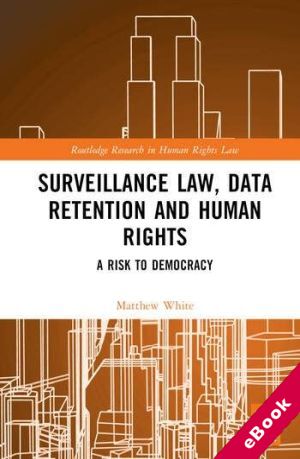
The device(s) you use to access the eBook content must be authorized with an Adobe ID before you download the product otherwise it will fail to register correctly.
For further information see https://www.wildy.com/ebook-formats
Once the order is confirmed an automated e-mail will be sent to you to allow you to download the eBook.
All eBooks are supplied firm sale and cannot be returned. If you believe there is a fault with your eBook then contact us on ebooks@wildy.com and we will help in resolving the issue. This does not affect your statutory rights.
This book analyses the compatibility of data retention in the UK with the European Convention on Human Rights (ECHR). The increase in the use of modern technology has led to an explosion of generated data and, with that, a greater interest from law enforcement and intelligence agencies. In the early 2000s, data retention laws were introduced into the UK, and across the European Union (EU). This was met by domestic challenges before national courts, until a seminal ruling by the Court of Justice in the European Union (CJEU) ruled that indiscriminate data retention was incompatible with EU law. Since then, however, the CJEU has revised its position and made certain concessions, particularly under the guise of national security.
This book focuses on data retention in the UK with the principal aim of examining compatibility with the ECHR. This is explored through a variety of ways including providing an account of democracy and why secret surveillance poses a threat to it, a history of data retention, assessing the seriousness that data retention poses to fundamental rights, the collection of rights that are affected by data retention which are crucial for a functioning democracy, the implications of who can be obligated to retain (and what to retain), the idea that data retention is a form of surveillance and ultimately, with all things considered, whether this is compatible with the ECHR.
The work will be an invaluable resource for students, academics, researchers and policy-makers working in the areas of privacy, human rights law and surveillance.